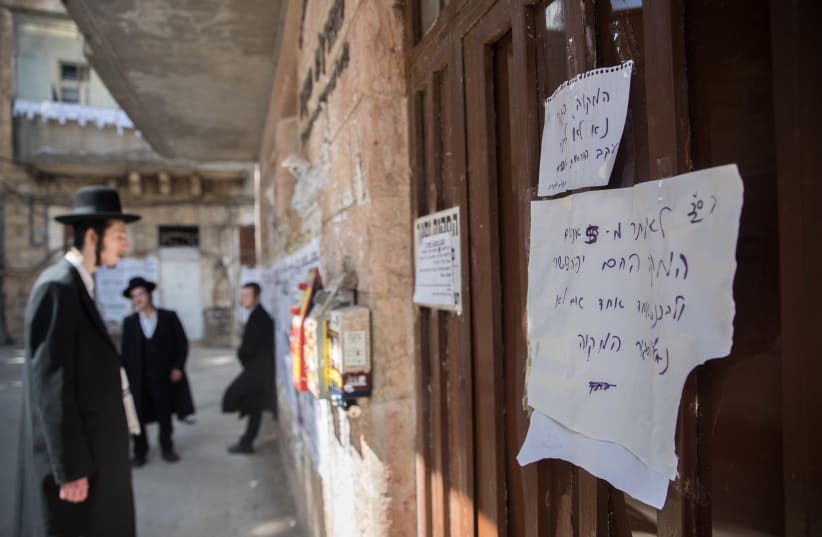Amid all the mayhem and chaos caused by the coronavirus pandemic in Israel, one phenomenon that has been especially noticeable is the effect it is having on the religious community.
To a great extent, Jewish rituals and traditions revolve around community and communal practices, but the highly infectious nature of the coronavirus (COVID-19) disease and the way it is spread from person to person has meant that many normative aspects of Jewish life have gradually ground to a halt.
Much of communal Jewish life takes place in synagogues, prayer services are communal, Shabbat and holiday meals frequently include large numbers of people, and religious study is performed in yeshivot with large numbers of students, in groups or with
study partners.
Life-cycle events have great religious significance such as brit milah ceremonies, bar and bat mitzvahs, weddings and funerals, and all involve large gatherings.
Indeed, a large percentage of coronavirus infections that occurred in Israel happened in synagogues, while festive meals over the recent Purim holiday are known to have caused a significant number of infections as well.
And serious questions have even been raised regarding immersion in a mikveh (ritual bath), a critical aspect of Jewish life for religious couples owing to its role in permitting marital relations.
As of Wednesday, prayer in synagogues is no longer allowed, gatherings of more than 20 people for celebrations have been prohibited for some time, and the general public is now barely allowed out of their homes, and when they do go out, they cannot stray
more than a few dozen meters away.
The dangers to the religious public have become clear to all in two small, religious towns, Telz Stone, which is ultra-Orthodox, and Efrat, which is religious-Zionist, where around a quarter of each town is under quarantine.
DESPITE THESE many difficulties, some solutions have been found through modern technology. Use of videoconferencing technology has become widespread to conduct Torah lessons, to broadcast celebrations such as weddings, and even to conduct virtual communal prayer, something Jewish law does not make easy.
Rabbi David Stav,chairman of the religious-Zionist Tzohar rabbinical organization, told The Jerusalem Post that he welcomes many of these solutions as an important tool in preserving the communal aspects of Jewish life as best as possible, while battling the pandemic at the same time.
And while he said that he is concerned about the almost complete cessation to real-world communal life for people whose religious and social lives revolve around religious practice, he said he believes that there will not be lasting damage.
“I have seen the struggle of people to keep communal life going as much as possible; and because so much of it has been taken away, this crisis will make people value the synagogue and community even more,” he said.
The rabbi said that he is concerned about seniors and the elderly, many of whom he said live for their interactions with their children, grandchildren and great-grandchildren, and who are and will continue to suffer severely in an extended lockdown.
But while modern technology has provided solutions for some religious people, others have not availed themselves of these resources, imperfect as they are, and have sought to continue life as usual, particularly in the ultra-Orthodox community.
Shutting down communal religious life for this sector is something almost unimaginable because of how completely the lives of the ultra-Orthodox revolve around religious practice.
And so it has proved to be, as the senior rabbinic leadership initially dismissed the danger of the viral pandemic and continued to allow communal life, especially in schools and institutions of religious study, to continue unimpeded, although much of the
community does now understand to a much greater extent the danger of the coronavirus.
Stav said that this reaction was understandable because of the manner in which the lives of the ultra-Orthodox revolve so completely around their religious practice.
He was, however, highly critical of the rabbinic leadership for insisting on the continuation of many aspects of religious life despite the clear dangers.
And he lambasted efforts to keep synagogues open for so long, noting that pressure had been brought to bear on Health Ministry officials to allow them to keep their doors open, and even now to allow prayer services outside with 10 men.
“I view very gravely religious leaders who should have been leading the fight to preserve life, pressuring officials not to close synagogues. I can’t understand it.
“You don’t play with danger to life, it’s that simple. Further, if tens of thousands of people die, and this was caused in part by such action, it would be a desecration of God's name on an incredibly massive scale and will cause much hatred of religion.”
